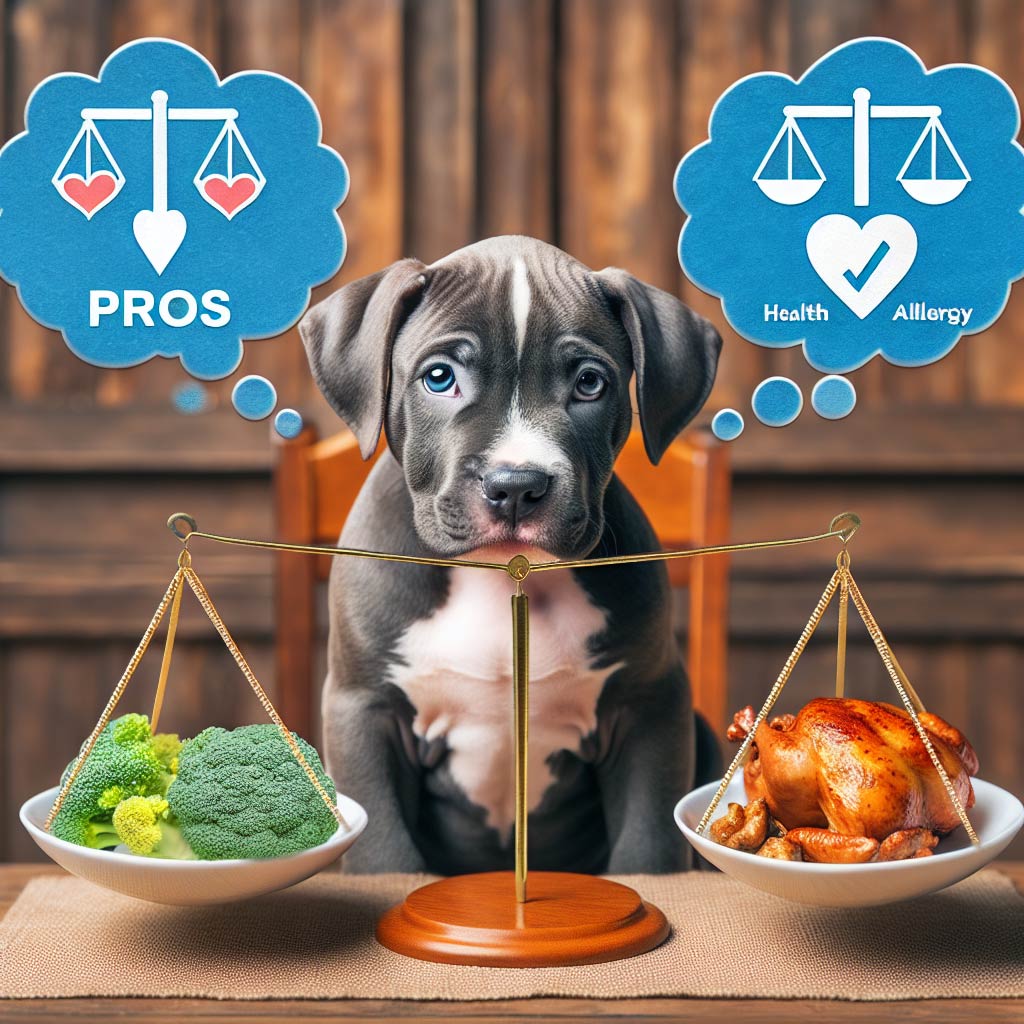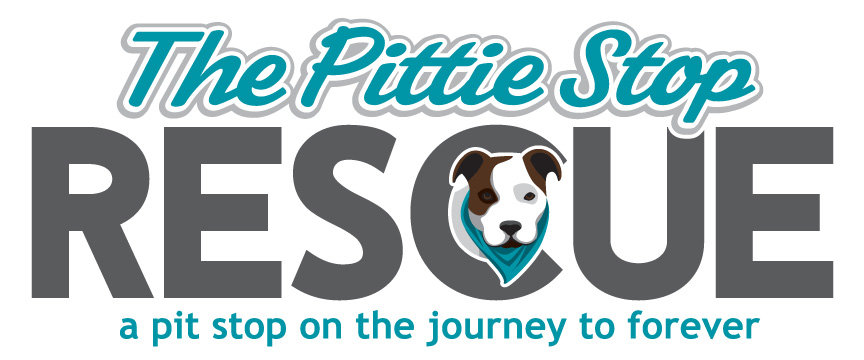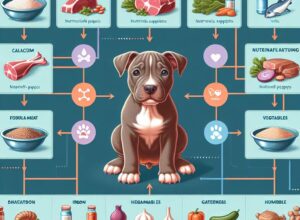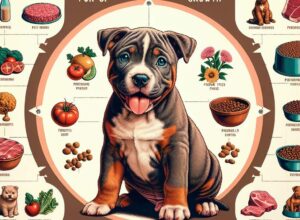
Feeding Your Pitbull Puppy: Is Chicken the Right Choice?
When it comes to feeding your pitbull puppy, you want to make sure they’re getting the best. Chicken is a common ingredient in dog food, but is it the right choice for your growing pup? Let’s find out.
Article-at-a-Glance: Key Takeaways
- Chicken is a great source of protein that can help with muscle growth in pitbull puppies.
- It’s important to cook chicken properly to avoid health risks like salmonella or E. coli.
- Not all pitbull puppies will react the same to chicken; some may have allergies or sensitivities.
- Balance is key – a diet too heavy in chicken can lead to nutrient imbalances.
- Always consult with your vet to tailor your puppy’s diet to their specific needs.
The Protein Puzzle: Chicken’s Role in Puppy Growth
Protein is vital for your pitbull puppy’s growth. It helps build muscles, repair tissues, and maintain a healthy immune system. Chicken, being high in protein, can be a fantastic option. But it’s not just about the protein – it’s also about how it’s served. Cooked and unseasoned chicken is best for your pup’s health.
Decoding the Diet: Understanding Nutritional Needs
Every pitbull puppy is unique, and their nutritional needs can vary. While chicken is nutritious, your puppy’s diet should also include a balance of fats, carbohydrates, vitamins, and minerals. This ensures they get a well-rounded diet to support their development.
The Benefits of Chicken in a Pitbull Puppy’s Diet
Chicken isn’t just a tasty treat for your pup; it’s also packed with benefits. It’s a lean protein that supports muscle growth and provides essential nutrients for your pitbull puppy’s overall health. Plus, it’s generally easy to digest, which is perfect for sensitive puppy stomachs.
Lean Protein: Building Blocks for Muscle Development
As your pitbull puppy grows, they need the right building blocks to develop strong, healthy muscles. Lean proteins like chicken are perfect for this. They provide the energy your puppy needs without the extra fat that can lead to weight gain.
Vitamins and Minerals: Nourishment for Overall Well-being
Chicken isn’t just about protein; it’s also a source of essential vitamins and minerals. These include B vitamins, which are crucial for energy production and cognitive health, and minerals like phosphorus and selenium, important for strong bones and a robust immune system. Including chicken in your pitbull puppy’s diet means they’re getting more than just protein—they’re getting a powerhouse of nutrients for their overall well-being.
Easily Digestible: Why Chicken Suits Puppy Stomachs
Pitbull puppies can have sensitive stomachs. The good news? Chicken is generally easy for them to digest. It’s a simple protein, free from the tough fibers found in red meats, which means it’s gentler on your pup’s digestive system. This can help prevent upset stomachs and ensure that your puppy absorbs more of the nutrients they need to thrive.
The Possible Downsides of Chicken for Your Pup
While chicken can be a nutritious part of your pitbull puppy’s diet, it’s not without its potential issues. Over-reliance on chicken, food allergies, and the debate between raw versus cooked chicken are all factors to consider. Let’s take a closer look at these potential downsides to ensure your puppy stays healthy and happy.
Food Allergies and Sensitivities: Recognizing the Signs
Just like humans, puppies can have food allergies or sensitivities, and chicken is one of the common culprits. Signs of an allergic reaction can include itchy skin, ear infections, and digestive upset. If you notice any of these symptoms in your pitbull puppy after introducing chicken to their diet, it’s important to consult your vet. They can help determine if an allergy is present and recommend alternative protein sources.
Debating Raw vs. Cooked: Safety Concerns Explored
Some pet owners swear by a raw diet, while others prefer to cook their dog’s food. When it comes to chicken, cooking is the safer option. Raw chicken can harbor bacteria like salmonella and E. coli, which can be harmful to both your puppy and your family. Cooking chicken thoroughly kills these bacteria, making it safer for your pup to eat.
Nutrient Imbalance: The Risks of a Chicken-Heavy Diet
Chicken is great, but too much of a good thing can be a problem. A diet too heavy in chicken can lead to a nutrient imbalance, particularly if it’s not balanced with other food groups. Puppies need a variety of nutrients to grow properly, and an overemphasis on chicken could mean they’re missing out on other crucial elements of a healthy diet, such as omega-3 fatty acids found in fish. It’s all about balance and variety to ensure your pitbull puppy gets everything they need.
Preparing Chicken for Your Pitbull Puppy
Getting chicken ready for your pitbull puppy isn’t complicated, but it’s important to do it right. The goal is to make it safe, nutritious, and delicious for your little companion.
From Farm to Bowl: Ideal Chicken Preparation Techniques
When preparing chicken for your puppy, start with high-quality, fresh chicken. Organic or free-range options are ideal as they’re often free from added hormones and antibiotics. Boiling chicken is a simple and effective way to cook it thoroughly without adding any harmful fats or oils. Once cooked, shred it into small, manageable pieces for your puppy to eat easily. Always ensure the chicken has cooled down before serving it to avoid any burns or discomfort.
Spice-Free Zone: Seasonings and Additives to Avoid
While we might enjoy herbs and spices in our meals, these can be harmful to dogs. Onion and garlic, for example, are toxic to dogs and should never be included in their diet. Stick to plain, unseasoned chicken. Also, avoid any additives like salt or preservatives, which can be unhealthy for your puppy. Remember, what’s bland to us is perfectly fine for them.
Alternatives to Chicken in Pitbull Puppy Diets
While chicken is a great protein source, it’s not the only one out there. Diversifying your puppy’s diet can help ensure they’re getting a range of nutrients and can also prevent food boredom.
Exploring Other Protein Sources: Ensuring Dietary Diversity
There are plenty of other protein sources to consider for your pitbull puppy’s diet. Beef, lamb, fish, and turkey are all excellent choices. Each comes with its own set of nutrients and benefits. For instance, fish is a great source of omega-3 fatty acids, which are excellent for your puppy’s skin and coat health. Just like with chicken, make sure these proteins are cooked well and served plain.
Plant-Based Proteins: Can They Meet Your Puppy’s Needs?
While meat is a common protein source for dogs, plant-based proteins can also play a part in a balanced diet. Ingredients like lentils, chickpeas, and peas are good sources of protein. However, they should not be the sole protein source for your pitbull puppy. Dogs are omnivores, and while they can process plant proteins, they do best with a diet that includes animal proteins.
Always consult with your vet before making any major changes to your puppy’s diet, especially if you’re considering introducing plant-based proteins. They can help you understand the right balance to ensure your puppy’s dietary needs are fully met.
When to Consider Hypoallergenic or Limited Ingredient Diets
If your pitbull puppy is showing signs of food sensitivities or allergies, it might be time to consider a hypoallergenic or limited ingredient diet. These diets are formulated to minimize the risk of allergic reactions by using protein sources that are less likely to cause issues, or by limiting the number of ingredients to rule out allergens. If your puppy is constantly itching, has recurrent ear infections, or suffers from gastrointestinal upset, talk to your vet about whether these specialized diets could benefit your furry friend.
Making the Choice: What’s Best for Your Pitbull Puppy?
Deciding whether to include chicken in your pitbull puppy’s diet comes down to their individual health, preferences, and nutritional needs. You’ll want to observe how they react to chicken, ensure they’re getting a balanced diet, and consult with your vet to make the best choice for your growing pup.
Reading the Signs: How Your Puppy’s Body Responds to Chicken
Keep a close eye on your puppy’s reaction after eating chicken. A healthy response includes good energy levels, a shiny coat, and regular bowel movements. If you notice any adverse reactions, such as itching, redness of the skin, or digestive issues, these could be signs that chicken might not be the best protein source for your puppy. Monitoring your puppy’s body responses is crucial in determining if chicken suits their diet.
Consulting the Expert: When to Talk to a Vet about Diet Changes
Changing your puppy’s diet is a decision that should involve a professional. If you’re considering introducing chicken to your pitbull puppy’s diet or suspect they might have a food allergy, it’s time to consult your vet. They can provide guidance based on your puppy’s specific health needs and even recommend tests to identify allergies. Always involve your vet before making dietary changes to ensure your puppy’s health and well-being.
Frequently Asked Questions (FAQ)
How much chicken can I feed my Pitbull puppy without risking allergies?
There’s no one-size-fits-all answer to how much chicken you can feed your pitbull puppy without risking allergies. Start with small amounts and observe your puppy’s response. If there are no signs of allergies, you can gradually increase the quantity. However, chicken should not be the sole protein source in their diet. Balance it with other proteins and consult with your vet to determine the right amount for your puppy’s specific dietary needs.
What are some common signs of a chicken allergy in puppies?
Chicken allergies in puppies can manifest in several ways. Keep an eye out for itchy skin, which may lead to scratching, biting, or licking certain areas excessively. Other signs include gastrointestinal issues like vomiting or diarrhea, ear inflammation, and poor coat quality. If you notice these symptoms, it’s crucial to consult your vet, as they can help pinpoint the allergy and suggest dietary adjustments.
Is it ever safe to feed my puppy raw chicken?
The short answer is no. Raw chicken can contain harmful bacteria such as salmonella and E. coli, which can cause serious health issues for your puppy and even for you. Cooking chicken thoroughly is the best way to ensure it’s safe for your furry friend to eat. Always prioritize your puppy’s health and safety when choosing how to prepare their food.
What are some chicken-free protein alternatives for my puppy’s diet?
If chicken isn’t suitable for your puppy, or you’re simply looking to mix things up, there are plenty of other protein sources to choose from. Some excellent chicken-free options include:
- Beef: Rich in iron and zinc, it’s a hearty alternative.
- Lamb: Often used in hypoallergenic dog foods for its easy digestibility.
- Fish: A great source of omega-3 fatty acids for brain and coat health.
- Turkey: Another lean protein that’s lower in fat than chicken.
- Eggs: Highly digestible and packed with essential amino acids.
- Pork: Ensure it’s cooked well to avoid parasites.
- Plant-based proteins: Such as lentils and chickpeas, though these should complement animal proteins rather than replace them.
Remember to introduce any new protein slowly into your puppy’s diet to monitor their reaction and avoid digestive upset.
If my puppy is doing well on a chicken-based diet, should I still consider rotating proteins?
Even if your puppy thrives on a chicken-based diet, rotating proteins can be beneficial. It exposes them to different nutrients and flavors, which can prevent food boredom and allergies over time. Rotating proteins also helps create a more balanced diet, ensuring your puppy gets a variety of essential nutrients. Discuss with your vet the best way to introduce new proteins into your puppy’s diet for optimal health.
As you navigate the journey of raising a healthy pitbull puppy, remember that their diet is a foundational aspect of their well-being. By being attentive to their needs, open to learning, and willing to adapt, you’ll be providing the best care possible. After all, a well-fed puppy is a happy puppy, and a happy puppy makes for a joyful home.



